In the year 2018, Shalom-SCCRR documented several key accomplishments and achievements in the Peacebuilding and Development programs implemented in the large semi-arid terrains of Kenya where it interfaces with Ethiopia, Somalia, South Sudan and Uganda. Shalom projects were implemented in the following counties: Turkana, West Pokot, Marsabit, Samburu, Isiolo, Nandi, Kisumu, Tana River, Nairobi and Nakuru. The project interventions are given two scopes: those focusing on conflict among ethnic pastoralists communities, and those designed to address the tensions and clashes in hazardous multi-ethnic informal urban settlements/slums. From the perspective of relative deprivation, populations in these areas have been severely marginalized in terms of socio-economic-infrastructure developments, notwithstanding that they live in 22 conflict environments.
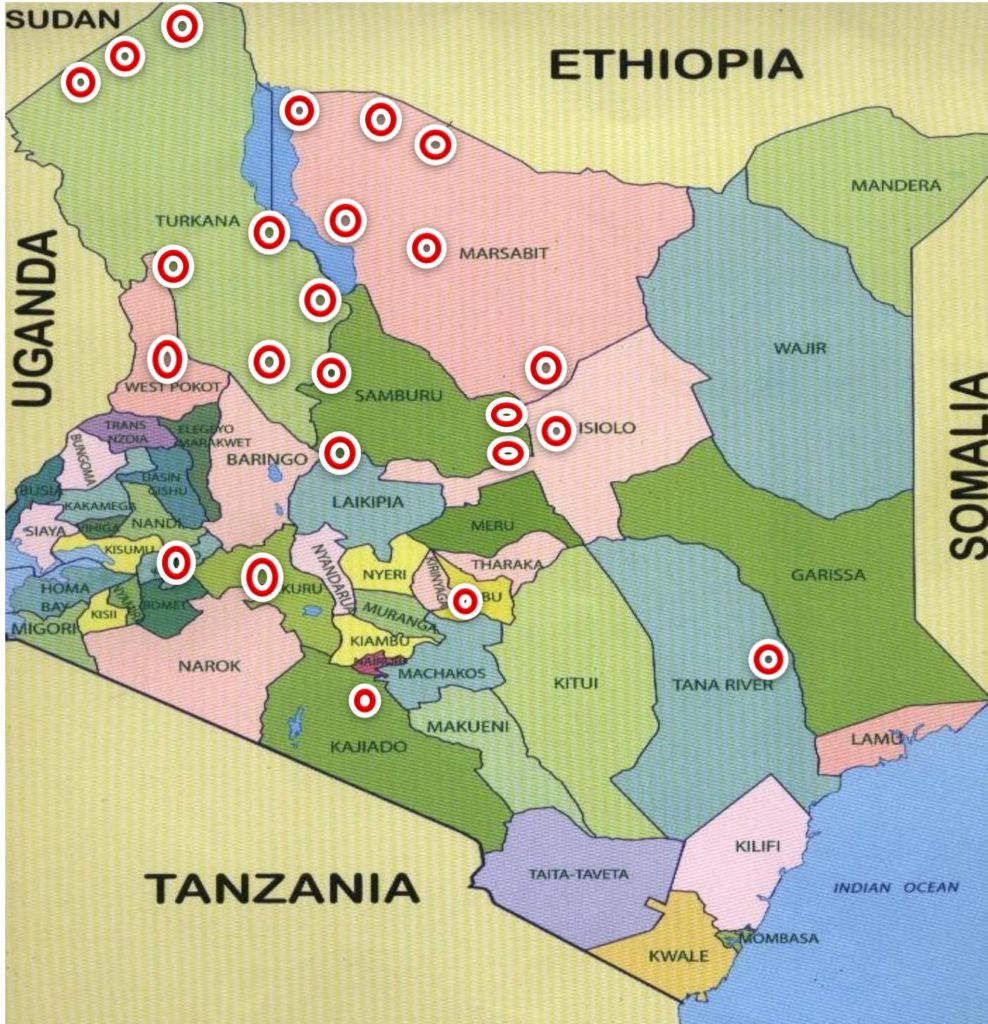
Map showing Shalom Peacebuilding and Schools Development Projects areas in conflict environments of Kenya and neighboring countries of Eastern Africa
Shalom Key Outcomes Areas 2018:
- To empower vulnerable and marginalized communities with knowledge and skills, and mechanisms for prevention and management of resource-based conflicts.
- To increase women participation in peacebuilding and decision making through education to communities on the role of women in conflict transformation and peacebuilding.
- To strengthen capacities of communities in conflict transformation through intra and inter-community dialogues and problem-solving approaches.
- To influence peacebuilding policies through engagement with National, County governments and strategic government agencies in conflict environments of Northern Kenya and informal settlements in urban areas.
- To empower interreligious institutional developments at the ‘grass roots’, and third level education (CUEA/Tangaza University), addressing issues of Conflict Analysis, Religion and Conflict, Radicalisation and Extremism, Peacebuilding Techniques, etc.
- To support schools and institutions of learning in conflict environments through provision of materials: classrooms, solar energy systems, desks, text books, instructional materials, teachers’ houses, dormitories, sanitary facilities, beds and dining materials.
- To promote peace education through formation of peace clubs, training of members and peace patrons in schools especially in areas of entrenched violent conflict.Map showing Shalom Peacebuilding and Schools Development Projects areas in conflict environments of Kenya and neighboring countries of Eastern AfricaMap showing Shalom Peacebuilding and Schools Development Projects areas in conflict environments of Kenya and neighboring countries of Eastern AfricaMap showing Shalom Peacebuilding and Schools Development Projects areas in conflict environments of Kenya and neighboring countries of Eastern Africa
Shalom Conflict Transformation and Peacebuilding 2018
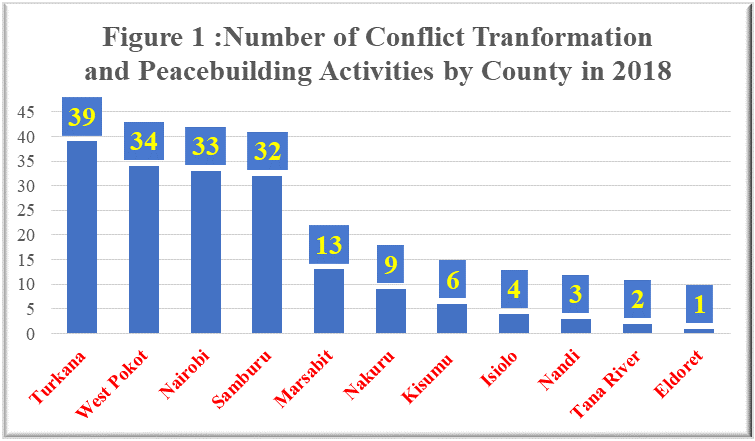
To empower vulnerable and marginalized communities with knowledge and skills, and mechanisms for prevention and management of resource-based conflicts; Shalom trained 2,023 participants selected through a participatory process from the affected communities along the borderline of Turkana – West Pokot Counties. In total, 73 activities were implemented in this conflict belt.
Other activities also implemented in 2018 were in Samburu, Nairobi and Marsabit with 33, 32 and 13 respectively as presented in Figure 1. Kisumu and Nandi are relatively new project areas therefore much of the work focused on community insertion and trust building activities which have been very successful.
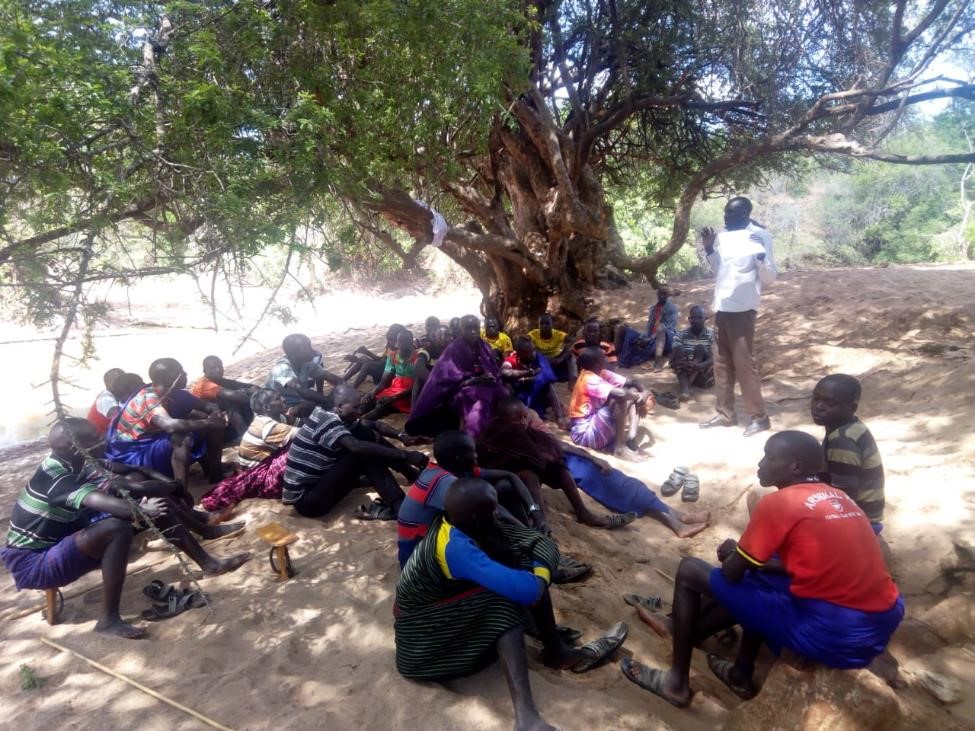
Shalom’s trained community facilitator engaging Morans (warriors) in Nauyapong, West Pokot County
There were a number of activities conducted in 2018 which were categorized based on the program design thematic areas of intervention. Figure 2 shows three key areas of Shalom’s conflict transformation and peacebuilding work conducted in 30 operational project areas targeting 22 conflict environments.
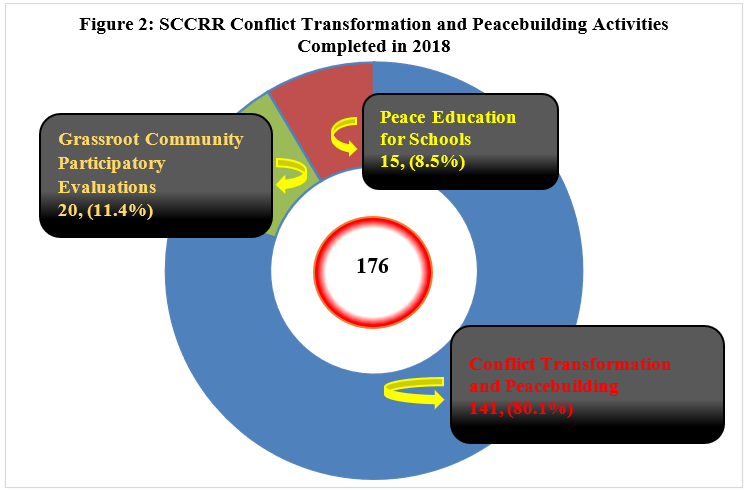
80.1% (141) of project activities implemented in 2018 focused on Conflict Transformation and Peacebuilding. 82 of the activities were training workshops in conflict mediation, negotiation, inter-community peace dialogues and conflict reconciliation. There were 45 activities out of 141 designed to directly engage local community members where views concerning the ongoing development of natural resource use and management plans. Communities were also involved in discussing issues such as improvement of road security, value of education for both boys and girls, and embracing of inter-ethnic schooling as an approach to conflict transformation.
Among activities completed in 2018, there were 9 round-table meetings held with County Governments and National Government’s strategic departments officials. 1 meeting was held with Cabinet Secretary, Ministry of Interior and Coordination of National Government, and Secretary of The National Steering Committee on Peacebuilding and Conflict Management (NSC). During this meeting Shalom’s shared the organization’s Strategic Plan 2018 – 2023, and how this would contribute to the national strategy on peace and security, and development especially through school projects. Currently, Shalom is working with NSC on a plan to offer training to Peacebuilding and Conflict management Regional Coordinators.
Shalom, acknowledges the role of politics in peacebuilding as an instrument for peacebuilding or fueling antagonism grievance and conflict. Hence, it is of priority to work with state agencies and political structures in areas of conflict to increase their buy-in into peace processes and to secure sustainability of any gains made. Shalom managed to train 16 Members of County Assembly (MCAs), 20 County Officials and 50 security officers (police) from West Pokot County on conflict transformation approaches.
Inter-community peace dialogues were initiated in the following conflict zones: Kariobangi informal settlement, Nairobi County; Morijo in Samburu involving Turkana, Samburu and Pokot ethnic communities; Mt. Kulal and Sarima in Marsabit involving the Samburu and Turkana ethnic communities.
8.5% (15) of project activities focused on peace education for schools, both for primary and secondary. Shalom envisages building a culture of peace in students through acquired knowledge, skills and values thus enabling them to live in harmony with oneself, others and the natural environment.
11.3% (20) of the work in 2018 was committed to project evaluations involving local communities in project areas. Surveys were conducted in Samburu and Marsabit to assess the effectiveness of ongoing peacebuilding activities in project areas. From the survey communities expressed satisfaction with Shalom’s conflict transformation and peacebuilding interventions. Communities noted a reduction in conflict frequency and intensity. As an outcome it has led to re-opening of markets; sharing of natural resources such as grass and water among pastoralists; enhanced road security and safe learning environments for their children in school. Nevertheless, there is work to be done because factors such as population pressure, both from human and livestock dimensions, and other variables linked to environmental degradation and climate change are creating new patterns and dynamics in conflicts.
Women and Youth Involvement in Peacebuilding Activities
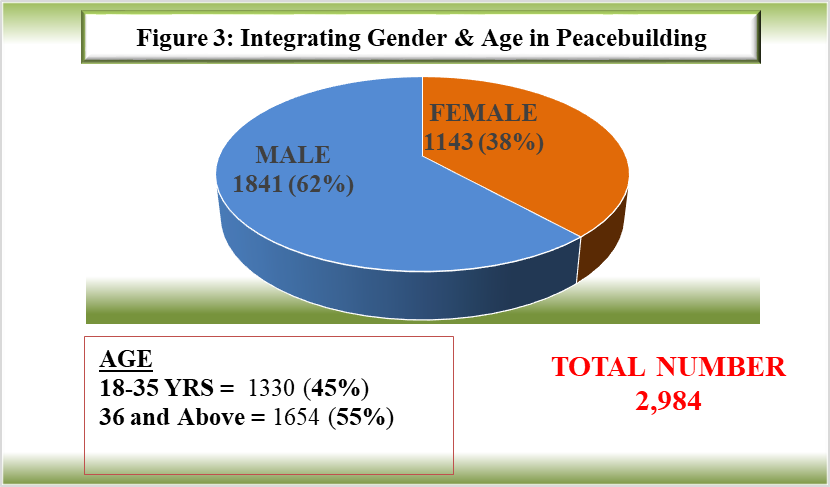
In total, in 2018 Shalom engaged 2,984 participants in conflict transformation and peacebuilding activities. This was 42% increase compared to 2017 where 2094 participants were engaged in groups. Among those trained 1143 (38%) were female and 1841(62%) male. The programs managed to have 45% (1330) of the participants as youth that is, the age between 18-35 years. Those of 36 years and above were 55% (1654) to the total participants. Shalom gives special attention to women and youth participation in Peacebuilding. Focus on women is in line with the Security Council 1325 Resolution that urges all actors to ensure women active participation in peace and security.
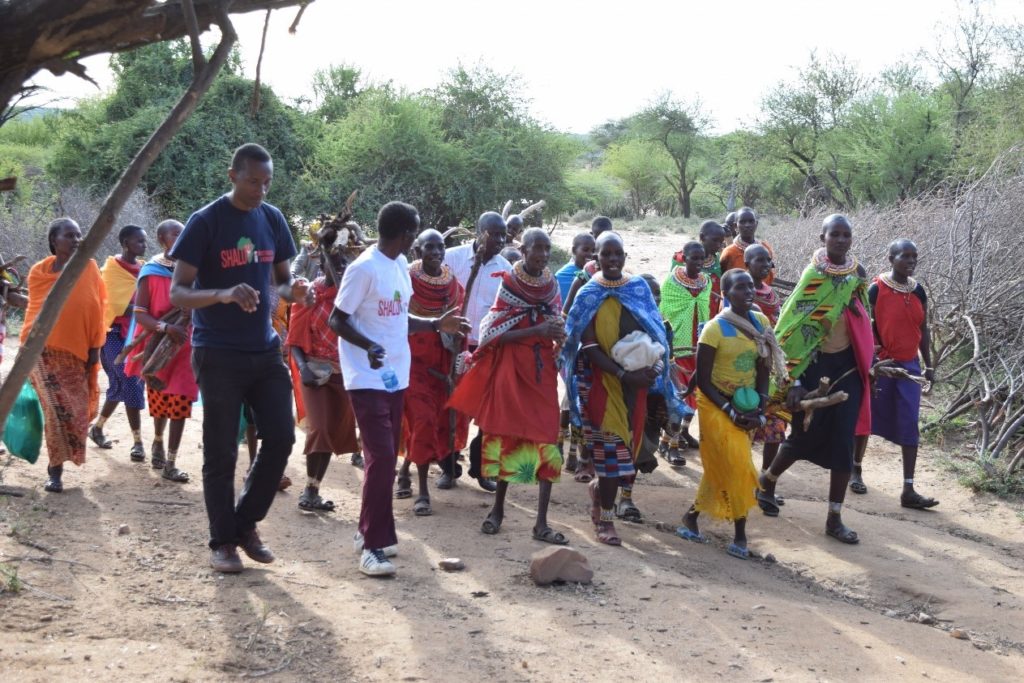
Shalom’s Francis Mwangi, MA, engaging women in peacebuilding activities in Samburu County
Peace Education in Schools: Building Culture of Peace
According to UNESCO 50% of world’s out-of-school children live in conflict affected countries. Whenever conflict occurs, children are likely to face a double loss. Their schools are damaged or completely destroyed. Children in conflict environments grow in a culture of violence which often shape the way they look at survival.
Shalom continues to work towards transforming the situation by: Introducing peace education in schools in the conflict environments and encouraging communities to embrace inter-ethnic learning.
In 2018 Shalom supported 11 peace clubs in Samburu, Marsabit, Turkana, West Pokot and Nairobi with materials for teaching and learning in peace education. Training was also offered to 768 peace club members.
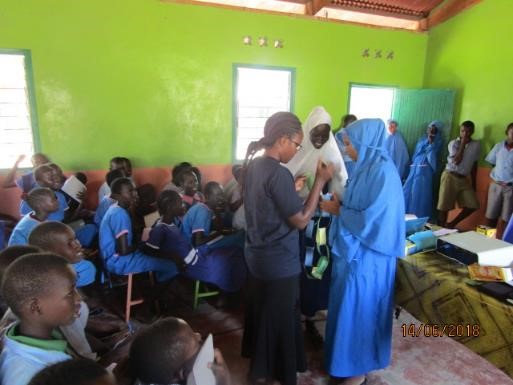
Shalom’s Esther Kibe, MA, facilitating a peace club training in Loiyangalani Primary School in Marsabit County
59 peace club patrons were trained in conflict resolution, management and peacebuilding to help facilitate the clubs and other school groups.
Peace clubs designed and implemented within and out of school peace activities. Through these activities they have reached to their parents and community members in the villages. School children are now a strong message of peaceful coexistence to their communities who are still entangled in protracted conflicts.
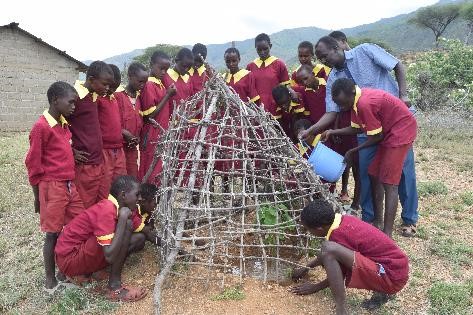
Lareorok Primary School Peace Club members at the Turkana Samburu border line engaging in a peace club activity
Education and Development Projects Contribution in 2018
Education is an important means for economic and social development both for individuals and societies. In conflict environments most schools have either poor or very dilapidated structures both for learners and teachers. Teachers lack minimal instructional materials, which negatively affect their motivation, not counting the fears of working in a conflict environment.
Shalom has been working to address the gap. Over years a lot of support has been provided to the schools in the conflict environments of Northern Kenya and informal urban settings. By numbers, in 10 years Shalom has supported 228 schools both primary and secondary; completing about 350 projects.
In 2018, a total of 46 educational and development projects were completed.
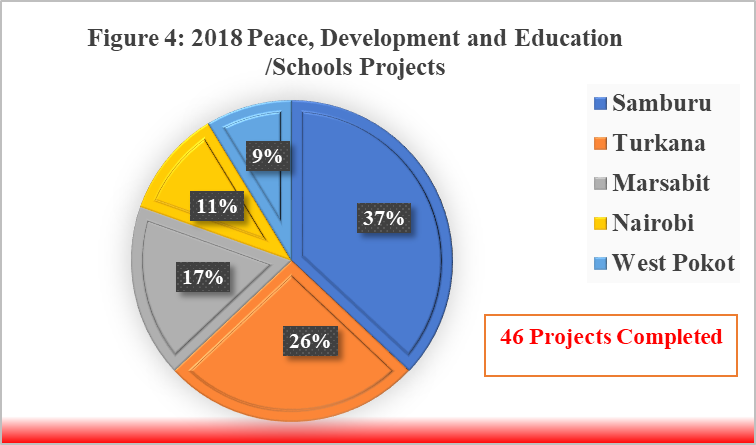
The projects involved construction of: 6 classrooms, 3 dormitories, 2 teachers’ houses, 4 toilets, 2 kitchens, and renovation of 11 classes. To improve sanitation and hygiene for schools, 4 water tanks were provided. 2 fences were installed in Loya and Kaputiro Primary schools in Turkana either to protect the children from wild animals or trespassers. In Amaiya Primary in Samburu and Kaputiro Primary dormitories for girls were furnished with 70 beds.
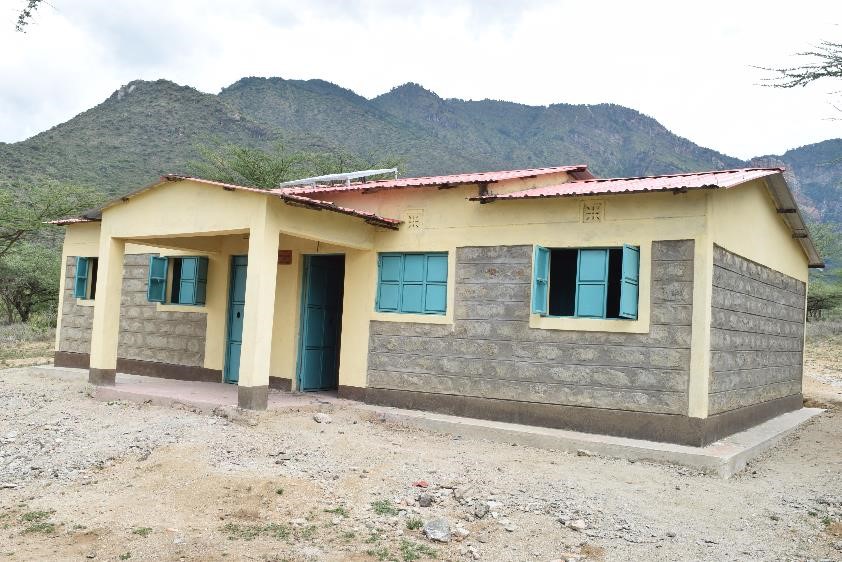
Shalom’s funded teacher’s houses in Simale Primary School, Samburu County
In the continued effort to promote science in school in the conflict environments, 10,800 school laboratory equipment items were supplied. 24 Solar accessories were also provided and installed which is a significant support especially for boarding schools and for shepherd learners who often can only learn at night.
To improve students learning, 303 desks, 160 lockers and 160 chairs were provided. 30 dining tables and 60 benches were supplied in different schools. In most schools, teachers have operated without desks and storage facilities for instructional materials. Shalom provided 20 office desks and 20 chairs for teachers. In total 1,400 text books were supplied for various schools that applied for help.

Shalom’s Arthur Magero, MA, engaging Morijo Primary School pupils to assess the usage of Shalom’s funded textbooks and desks
Shalom 2018 Peacebuilding Outcomes in Summary
- Increase in number of women participating in peacebuilding and decision making in communities.
- Increase in number of youths participating in peacebuilding and embracing alternative livelihoods such as farming and small-scale businesses.
- Reduction of violent conflicts in project areas leading to opening of markets in Tuum-Parkati and Longewan in Samburu County.
- Improved communication/road security; supporting livelihoods for populations in the conflict environments.
- Reduction of conflict providing for continuity and general stability of schools and medical centers in project areas.
- Community agreements on sharing of common resources such as water and pasture in Morijo, Marti, Loosuk and Longewan in Samburu and Kainuk and Turkwel in Turkana.
- Development of grazing plan agreements between local community of Longewan Samburu and ranch owner.
- Establishment of 4 Natural Resource Management Committees in Kainuk and Turkwel – Turkana-West Pokot NRM project. They are key in supporting the process of developing Natural Resource Management plans. The intervention is estimated to directly impact on a population of more than 20,000 people from 21 villages along the conflict borderline.
- Inter -ethnic and groups dialogue forums in Mathare and Kariobangi to address conflict issues in the informal settlements.
- Training of 768 peace club members who are actively engaged in school and with local communities.
- Training of 59 peace club patrons in charge of peace clubs’ activities in project areas who have been supported with necessary materials for conducting peace activities.
- Completion of 46 education and development projects hence transforming teaching and learning environments.
- Provision of school laboratory equipment giving opportunity for students in conflict environments to have a chance to join the world of science.
- Construction of dormitories giving opportunities to girls and boys to attend school; if girls stay at home they are frequently married off young (12-15yrs) while boys become herders later to be initiated into Moranism (Warrior stage).
- Completed its ninth consecutive year of teaching the course on ‘Conflict Resolution and Reconciliation’ at Tangaza University College-CUEA to students from all over Africa, while Shalom personnel also contributed relevant programs in other third level institutions.
To prevent, manage, transform, settle and resolve conflict there is indisputable value in continuing to empower poor and marginalized communities with knowledge and skills in conflict transformation and peacebuilding. Peacebuilding designs must make use of local knowledge by mapping existing peace resources such as traditional institutions, mechanisms, and networks for conflict resolution. Locals must be involved in every process of a peacebuilding project cycle; from analysis to monitoring and evaluation. This way they can become architects of their own future.
Education cannot be just a privilege because it is fundamentally a human right. However, in conflict environments education is a privilege for a lucky few. To have impact on the lives of children and families in conflict environments, it is justifiable and imperative to have more investment go to education.
By supporting peace, education and development in Northern Kenya and the informal urban settlements, Shalom seeks to respond to the basic human and ontological needs of people who hope for a better future, positively actualizing their potential. Shalom interventions are productively inserted in project areas; it has built relationships, and supports local ownership for sustainability of peacebuilding and development.
Shalom acknowledges that without support of the donors, conflict transformation, peace education for children in conflict environs, and development projects for schools would not be possible. Through the funds provided, schools have better learning environment, children are growing in a culture of peace and communities can begin to coexist and share common resources. Shalom continues to empower communities so that they can become architects of their own future – a progression made possible by the humanity and goodness of our incredible donors and friends. Of every $1 donated 94 cents goes directly into the peace and development projects.
By Francis Mwangi, MA, BA. (Monitoring, Evaluation & Learning Coordinator)

